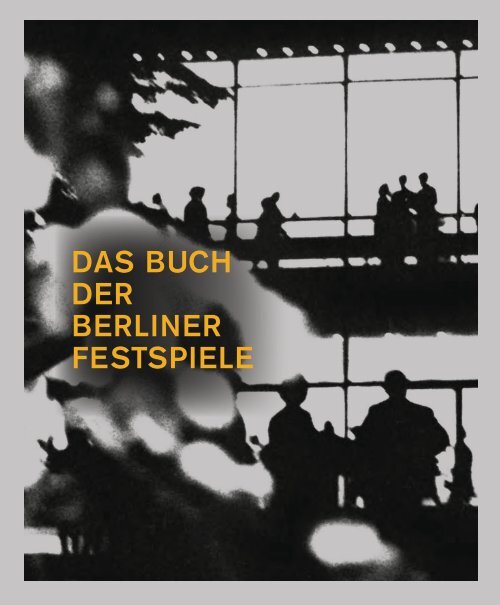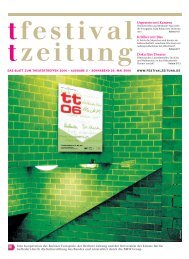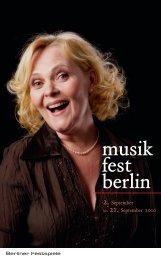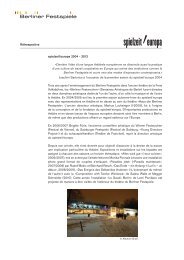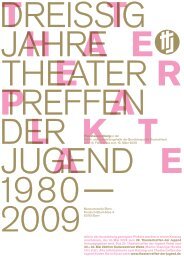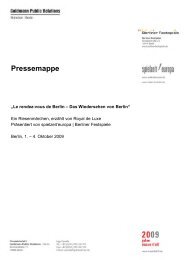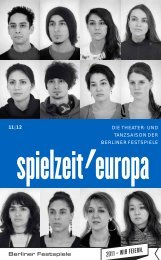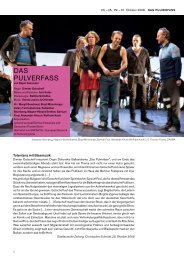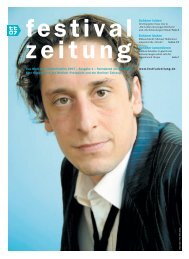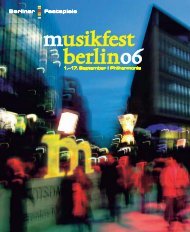Excerpt - Berliner Festspiele
Excerpt - Berliner Festspiele
Excerpt - Berliner Festspiele
Create successful ePaper yourself
Turn your PDF publications into a flip-book with our unique Google optimized e-Paper software.
Das Buch<br />
Der<br />
<strong>Berliner</strong><br />
<strong>Festspiele</strong>
Summary<br />
The first section ‘The Many Are One’ introduces all of the<br />
<strong>Berliner</strong> <strong>Festspiele</strong>’s programme series and their artistic work<br />
over the last ten years, the Haus der <strong>Berliner</strong> <strong>Festspiele</strong> and<br />
the Martin Gropius Bau in both words and pictures.<br />
In the second section ‘Continuities, Breaks, New Perspectives’,<br />
four essays highlight the political, social, artistic and<br />
philosophical background to the creation and transformation<br />
of the <strong>Berliner</strong> <strong>Festspiele</strong>, above all under the artistic direction<br />
of Joachim Sartorius<br />
After the first two sections look back and behind the scenes,<br />
Henning Wagenbreth’s comic XPRSS FSTVL takes a humorous<br />
and ironic view at the festival of the future.<br />
The last section of the <strong>Berliner</strong> <strong>Festspiele</strong> Book takes the<br />
form of a timeline including all <strong>Berliner</strong> <strong>Festspiele</strong> events<br />
from 2001 to 2011, contrasting the in depth essays and<br />
drawings with the sheer weight of everything which has<br />
been achieved during Joachim Sartorius’s tenure as Artistic<br />
Director.<br />
The MANy ARe ONe<br />
helga de la Motte-haber, Emeritus Professor of Musicology<br />
at the TU Berlin, describes in her article ‘Looking Back; 10<br />
years of MaerzMusik’ the special qualities of MaerzMusik as<br />
a contemporary music festival, analyses key performances<br />
since 2001 and uses her expert knowledge to place them in<br />
the context of the history of the avant garde.<br />
In ‘You can stand the Theatertreffen or are we sitting in a<br />
locked bus?’ writer Moritz Rinke paints an equally subjective<br />
and critical portrait of the Theatertreffen, questions how<br />
much reality it contains and comes to the conclusion that it’s<br />
just not possible to do without this show of strength from the<br />
German-speaking theatre.<br />
Music journalist and musician habakuk Traber uses a fine<br />
pen and a keen awareness of the social and political situation<br />
to sketch the historical development of the musikfest<br />
berlin in his contribution ‘The Art of Transition. From the<br />
<strong>Berliner</strong> Festwochen to the musikfest berlin’ assessing significant<br />
concerts since 2005 and the curatorial signature of its<br />
artistic director Winrich Hopp.<br />
Journalist Sabine Vogel reveals a wealth of anecdotes in<br />
her contribution ‘We had no idea how little we knew’ on<br />
the “classless literary society” which comes together every<br />
year at the international literature festival berlin. In ‘Not for<br />
the Moment’ Shelly Kupferberg describes the challenge of<br />
getting children – the most honest audience in the world – to<br />
show more interest in the world of books as part of the ilb’s<br />
children’s and young people’s literature programme.<br />
The journalist and writer Wolf Kampmann’s contribution<br />
‘JazzFest Berlin – an image of the swarm’, is a filmic journey<br />
in literary form to the JazzFest Berlin: the author approaches<br />
the Haus der <strong>Berliner</strong> <strong>Festspiele</strong> on a dull November evening<br />
from the perspective of a camera and allows the atmosphere<br />
of the JazzFest Berlin and a number of its most successful<br />
concerts from the past decade to be resurrected in front of<br />
our eyes.<br />
In ‘spielzeit´europa. Memories, Perspective, Insights’ former<br />
theatre director Nele hertling draws on her experience<br />
of presenting international theatre in Berlin to trace<br />
the developments which led to the evolution of the recent<br />
spielzeit´europa festival and recalls great theatrical moments<br />
from the <strong>Berliner</strong> <strong>Festspiele</strong>’s international dance and theatre<br />
season.
The author Khesrau Behroz, who was invited to the 2009<br />
Young Authors’ Meeting, describes in ‘You and Us. The<br />
Youth Competitions’ in a literary and poetic manner the thrill<br />
of suddenly being taken seriously as a writer as a young<br />
participant in the Youth Competitions while at the same time<br />
being confronted with the obligation and the opportunity to<br />
be a mature artist.<br />
In ‘Heroes of the Whole. The <strong>Berliner</strong> Lektionen’ lawyer and<br />
novelist heiko Michael hartmann praises the concentration<br />
on what is truly significant and the lack of obviousness which<br />
raises each of the <strong>Berliner</strong> Lektionen talks above the level<br />
of general chatter served up to us every day in talk shows,<br />
in politics and on the streets, making each of its ‘lecturers’ a<br />
‘hero’.<br />
In ‘Taxi! Take me to the Haus der <strong>Berliner</strong> <strong>Festspiele</strong>’ dramaturg<br />
henrik Adler describes a triple transformation, the<br />
difficult circumstances in 2001 under which what had been<br />
Freie Volksbühne theatre became the Haus der <strong>Berliner</strong><br />
<strong>Festspiele</strong>, how the <strong>Berliner</strong> <strong>Festspiele</strong> have gradually begun<br />
to belong in the building and how following extensive renovation<br />
works it became a genuine festival house in 2011.<br />
Last but not least arts journalist and writer Peter von Becker<br />
paints a large-scale tableau of the martin Gropius Bau in<br />
‘The Museum as the largest Microscope in the World. A decade<br />
of the <strong>Festspiele</strong> at the Martin Gropius Bau’ , accounting<br />
for its location in direct proximity to so many key sites<br />
of the Third Reich and its rescue from demolition in 1981 as<br />
well as its legendary exhibitions, many of which have referenced<br />
this history.<br />
CONTiNuiTieS, BReAKS, NeW PeRSPeCTiVeS<br />
Michael Naumann, politician, editor of ‘Cicero’ magazine, and<br />
first Minister of State for Culture and the Media until the end<br />
of 2000, writes in ‘The <strong>Berliner</strong> <strong>Festspiele</strong> – a decade under<br />
Federal Government’ about the political and the personnel<br />
reasons for the Federal Government’s decision to fund the<br />
<strong>Berliner</strong> <strong>Festspiele</strong> fully from 2001, which was connected to<br />
its recent choice of Berlin as the new old German capital city.<br />
The Artistic Director sums up the last ten years of artistic<br />
work in ‘New Games. New Rules? A Look Back Into The<br />
Future.’ Joachim Sartorius reflects on his time as Artistic<br />
Director of the <strong>Berliner</strong> <strong>Festspiele</strong>, writes about restructuring<br />
the organization, taking over and founding new festivals, acquiring<br />
and renovating the Haus der <strong>Berliner</strong> <strong>Festspiele</strong>, and<br />
the achieved and unachieved goals during his time as Artistic<br />
Director.<br />
In her essay ‘Is Art a Weapon? The <strong>Berliner</strong> Festwochen<br />
as a special case of Ostpolitik.’ Journalist and writer Kerstin<br />
Decker reveals the political implications of many of the –<br />
apparently autonomously artistic – decisions in founding the<br />
<strong>Berliner</strong> Festwochen, its development and that of its ‘counterfestival’<br />
in East Berlin, the <strong>Berliner</strong> Feststagen, and other<br />
stories from the cold war era which now seem highly bizarre.<br />
Finally in ‘Entertainment Through Art. Festivals from a<br />
Philosophical and Sociological Perspective’, philosopher and<br />
sociologist Sigbert Gebert offers an analysis of the anthropological<br />
roots of festivity, the historical creation of festive<br />
arts events and ultimately arts festivals devoted to a specific<br />
location such as the <strong>Berliner</strong> <strong>Festspiele</strong> were and are.
example from the ComiC Xprss Fstvl by henning Wagenbreth
the genealogy of berliner feStSpiele<br />
Die <strong>Berliner</strong> <strong>Festspiele</strong><br />
ein taBleau<br />
»Das Fest der einheit«<br />
2. /3. Oktober 1990<br />
Fest zur »750-Jahr-<br />
Feier« Berlins<br />
1987<br />
»Das Neue Berlin«<br />
Mai 1999 bis 2001<br />
»<strong>Berliner</strong> Festwochen«<br />
aufgelöst 2003<br />
Internationales<br />
literaturfestival berlin<br />
Gegründet 2001<br />
seit 2005 unter dem Dach<br />
der <strong>Berliner</strong> <strong>Festspiele</strong><br />
musikfest berlin<br />
Gegründet 2005<br />
Hervorgegangen aus »<strong>Berliner</strong> Festwochen«<br />
spielzeit’europa<br />
Gegründet 2004<br />
MaerzMusik<br />
Hervorgegangen aus<br />
»Musik-Biennale« 1991–2002,<br />
gegründet 1967 in Ost-Berlin<br />
1.–4. »internationale<br />
sommerfestspiele Berlin«.<br />
1978, 1979, 1980, 1981<br />
Theatertreffen<br />
Gegründet 1964 als<br />
»<strong>Berliner</strong> theaterwettbewerb«<br />
Martin-Gropius-Bau<br />
als ausstellungshaus<br />
wiedereröffnet 1981<br />
seit 2001 teil der<br />
<strong>Berliner</strong> <strong>Festspiele</strong><br />
1.–3. »Metamusik-Festival«<br />
1974, 1976, 1978<br />
»<strong>Berliner</strong> Musiktage«<br />
1972 und 1980<br />
<strong>Berliner</strong> Lektionen<br />
Gegründet 1987<br />
anlässlich der<br />
»750-Jahr-Feier« Berlins<br />
1. <strong>Berliner</strong> FestWOcHen 1951<br />
5. bis 30. september 1951<br />
Fusion »<strong>Berliner</strong> <strong>Festspiele</strong>«,<br />
»Haus der Kulturen der Welt«,<br />
»internationale Filmfestspiele Berlin«<br />
zur »Kulturveranstaltungen des Bundes<br />
in Berlin GmbH«, 2002<br />
Treffen Junger Autoren<br />
Gegründet 1986<br />
Treffen Junge Musik-Szene<br />
Gegründet 1984 als<br />
»treffen Junger liedermacher«<br />
JazzFest Berlin<br />
Gegründet 1964 als<br />
»Jazztage Berlin«<br />
Theatertreffen der Jugend<br />
Gegründet 1980 als<br />
»schülertheatertreffen«<br />
»internationale Filmfestspiele Berlin«<br />
(Berlinale)<br />
seit 2002 eigenständige institution<br />
»Haus der Kulturen der Welt«<br />
Gegründet 1989 als<br />
eigenständige institution<br />
»topographie des terrors«,<br />
ausstellung 1987<br />
Weitergeführt als<br />
eigenständige institution<br />
»Horizonte – Festival<br />
der Weltkulturen«<br />
Gegründet 1979,<br />
weitere ausgaben<br />
1982, 1985, 1989<br />
1. <strong>Berliner</strong> FilM<strong>Festspiele</strong> 1951<br />
6. bis 17. Juni 1951


